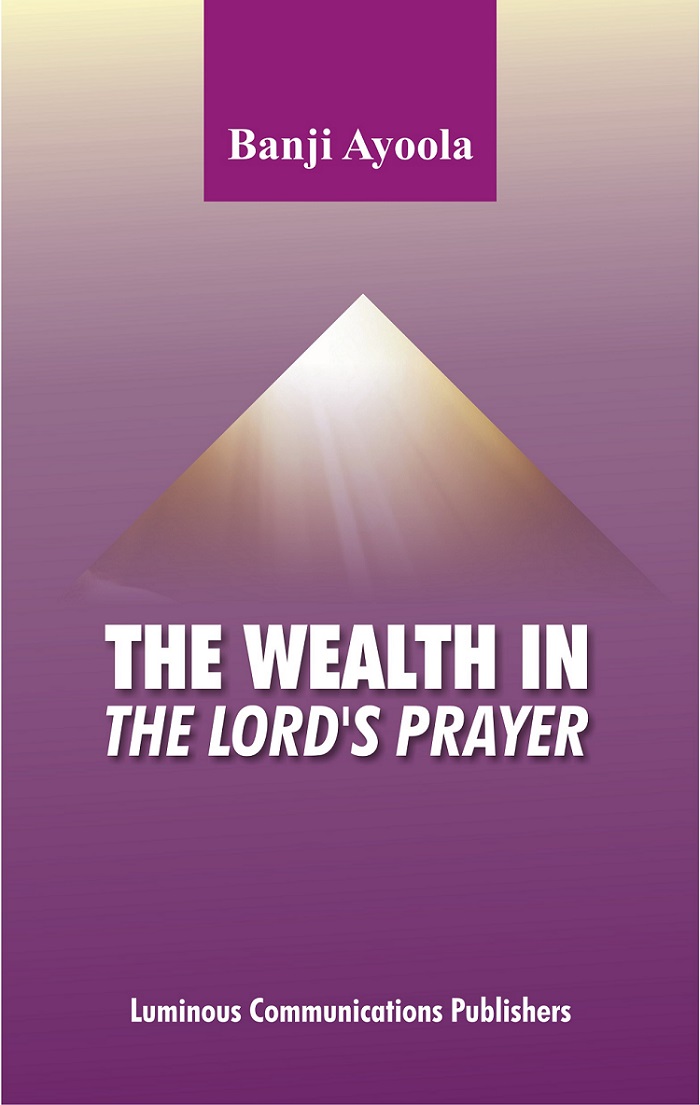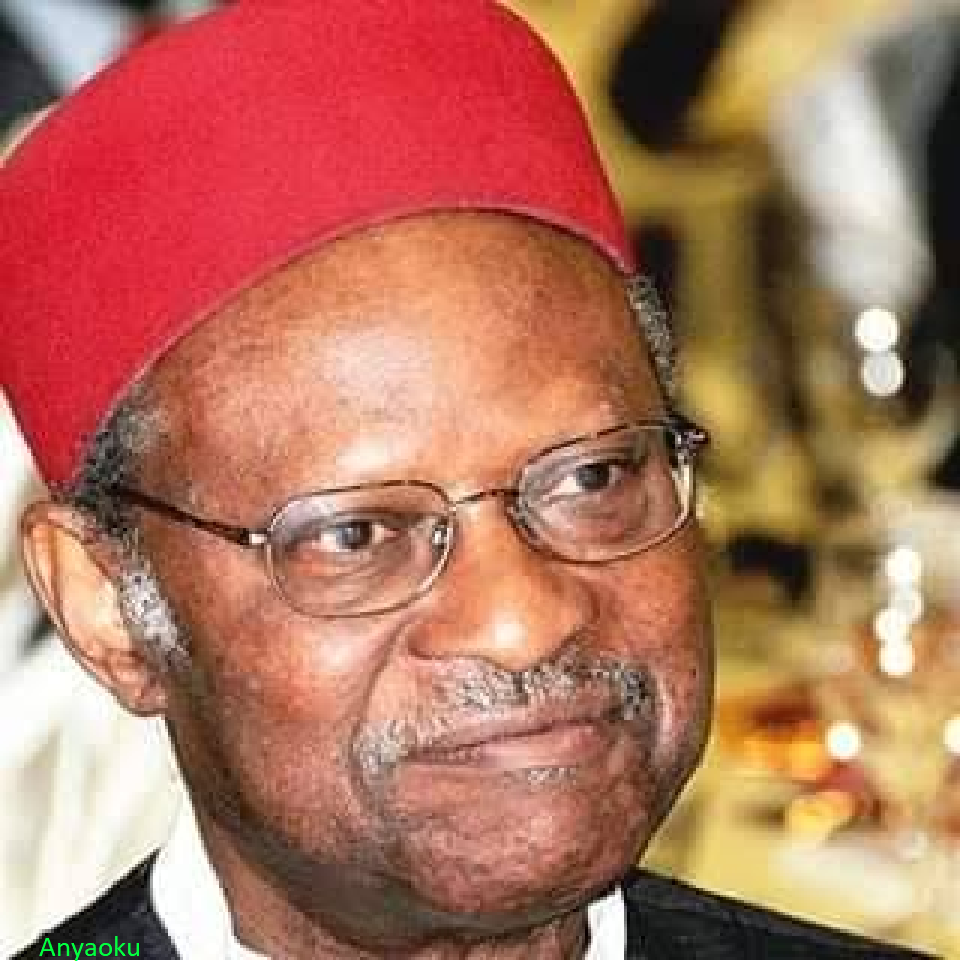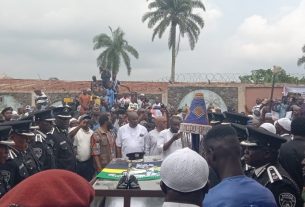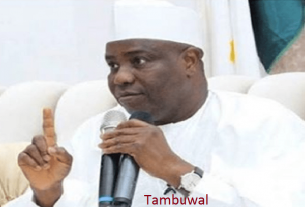Former Commonwealth Secretary-General, Chief Emeka Anyaoku, GCON, and Convener, The Patriots
By Banji Ayoola
A former Presidential aspirant under the banner of the Peoples Democratic Party, PDP, Dr. Nwachukwu Anakwenze, has urged President Bola Ahmed Tinubu, GCFR, and the National Assembly to heed the call of The Patriots headed by Chief Emeka Anyaoku, GCON, for the restructuring of Nigeria into a balanced federation, that indiscriminately takes care of all the component groups.
In a statement on Sunday by his Director General/Spokesman, Comrade Eric Oluwole, Anakwenze said that he wholly identified with the timely, patriotic and selfless intervention of the eminent Nigerians in the efforts to rebuild Nigeria on the platform of real justice, fairness and equity.
He said: “I hereby commend The Eminent Patriots led by the revered Chief Emeka Anyaoku, GCON, for this yet another timely intervention to ensure that we rebuild our dear country Nigeria on a solid pedestal of true justice, fairness, equity and balance.”
Anakwenze said, “I wholeheartedly identify with the exemplary courage, patriotism, sacrifices, and selflessness of these eminent Nigerians with their timely intervention, and brilliant recommendations, in the ongoing efforts to build a new Nigeria, which will indiscriminately and genuinely cater for the interests of all her citizens, irrespective of places of birth, religions or any other narrow considerations.
“Therefore, I appeal to our President, Asiwaju Bola Ahmed Tinubu, GCFR, to, as soon as possible, initiate a Bill on this most crucial subject of restructuring our Country into a true and balanced federation, and transmit same to the National Assembly for passage soonest.
“History will be kind to President Tinubu, GCFR, and this set of our National Assembly led by Senator Godswill Akpabio, and Rt. Hon Takudeen Abbass, and comprising other eminent Senators and Representatives, for being the leaders who rebuild Nigeria in line with the dreams of her founding fathers, and in accordance with the popular will of her people across board.”
The Eminent Patriots of Nigeria, otherwise called The Patriots, Nigeria’s foremost group of elder statesmen and women, intellectuals and civic leaders, led by the former Secretary-General of the Commonwealth, Chief Emeka Anyaoku, GCON, in collaboration with the Nigerian Political Summit Group (NPSG), had at the end of a two-day “National Summit on The Future of Nigeria’s Constitutional Democracy”, in Abuja, on July 17, 2025, passionately called on the President and the National Assembly to restructure the country soonest.
Delegates at the summit were drawn from the civil society groups, women, the academia, ethnic nationalities, Nigerians in Diaspora, professional groups, faith-based organisations, traditional rulers, religious leaders, youth groups, market men/women, security experts, student leaders, the private sector and persons with special needs across the country.
The summit, which examined and responded to the deep-rooted and systemic challenges confronting Nigeria and its diverse peoples, deliberated on issues “that touch on the urgent need to reposition the country through a new, inclusive democratic people’s Constitution of the Federal Republic of Nigeria.”
According to the communique, signed by Chief Anyaoku, GCON, the summit noted that “the present systemic structural and governance failures and dysfunction under the current 1999 Constitution (as amended)” failed to address “the aspirations of the Nigerian people for fairness, social justice, equity, security, and sustainable development”.
It stressed that the inherent flaws in, and consequences of the said 1999 Constitution, which did not derive its legitimacy from popular participation and approbation of the Nigerian people, manifest in the decline into unitary system; and poor leadership and weak delivery of governance arising from weak political structures and institutions;
They include declining sense of citizenship and patriotism; an increasing multi-dimensional poverty and inequality that threaten peace, unity and development; widespread fear, anxiety and an increasing feeling of hopelessness; and acute corruption and lack of accountability/transparency.
Others are insecurity across regions; sectional, ethnic, and religious conflicts with various dimensions and scope that have further weakened national unity and mutual distrust; poor infrastructure; poor management of the economy manifesting in disconnection from human capital development as well as environment mismanagement; and poor adaptation strategy resulting in increasing vulnerability of Nigeria and Nigerians to climate change.
Convinced that “Nigeria as a political entity needs holistic restructuring and comprehensive overhaul of the existing constitutional framework and governance architecture”, the summit stressed the need for “a new course for enduring future through renewed and unflagging commitment to demanding a new inclusive; democratic peoples Constitution of the Federal Republic of Nigeria”.
The summit therefore recommended far reaching remedies for Nigeria’s pressing constitutional and governance crises including a new, representative people’s Constitution that addresses the country’s pluralism, and challenges stressing, “there is the need for a new people-driven, inclusive, democratic Constitution anchored on true federalism”.
Other recommendations include
- A Constituent Assembly with delegates elected through the Independent National Electoral Commission, INEC, on non-partisan basis, and special interest groups representatives;
- A peoples democratic Constitution that will be subjected to a referendum of the Nigerian people before it is assented to by the President;
- Return to a truly federal system of government where the federating units will enjoy their autonomy as obtained in the First Republic and other genuine democracies of the World;
- A federal system of government as the current presidential system is too expensive, prone to abuse; constitutes a hindrance to people’s welfare and a major threat to the future of democracy in Nigeria;
- Geographical restructuring;
- Devolution of Federal powers from the centre to the federating units;
- A more appropriate cost-effective system as the current. two-chamber federal legislature is unsustainably expensive for Nigeria to maintain;
- Each federating unit to have its court hierarchy up to the Court of Appeal, thereby leaving the Federal Supreme Court to deal with heavy Constitutional matters, interstate disputes, and disputes between the Federal and subnational governments, and Creation of special courts to manage special offenses such as electoral matters, corruption and terrorism cases;
- Decentralised justice system administration;
- Appointment of Non-politically Partisan Attorneys-General;
- Electoral reforms including amendment to the Electoral Act and the relevant sections of the 1999 Constitution (as amended) for Bimodal Voter Accreditation System (BVAS) and electronic transmission of results real time to be made mandatory;
- The new Constitution should include provision for independent candidacy, and outlaw cross-carpeting;
- Reduced cost of governance by cutting down overbloated bureaucracies and political structures at both state and federal levels;
- Federal, and regional ministries should not be more than 15, while departments and agencies should be reduced to one quarter of the existing number;
- A comprehensive restructuring of the police and the court system for effective, corruption-free justice delivery;
- Citizens’ rights/Empowerment initiatives to cater for over 20 million Nigerian children out of school, over 130 million Nigerians who wallow in multidimensional poverty, and over 50 percent infrastructure deficit covering roads, transport, electricity, housing, water and sanitation;
- Gender equity and explicit provisions protecting women and the girl child against all forms of abuse and discrimination, and protection of people’s socio-economic and political rights like education, security and employment;
- Inclusion in the voting process the over 15 million disenfranchised Diaspora Nigerians;
- Establishment of border/coastal security guards to support the conventional security forces, and community-based border policing model to the nation’s security systems to enhance national security architecture and strategy;
- Statutory rotation of headship of national security agencies among the sub-nationals;
- Given her pluralism, Nigeria shall in perpetuity remain a secular state;
- Urgent creation of state police to tackle the pervasive internal security issues across the geopolitical zones;
- Constitutional autonomy for the federating units as in the First Republic with each region having its independent constitutions in addition to the Federal Constitution; and
- Restoration of fiscal federalism and resource control.







